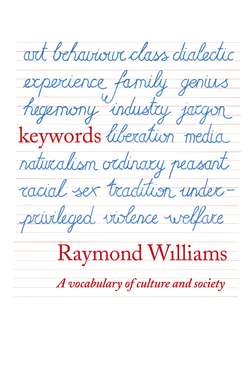Читать книгу Keywords: A Vocabulary of Culture and Society - Raymond Williams - Страница 29
COMMON
ОглавлениеCommon has an extraordinary range of meaning in English, and several of its particular meanings are inseparable from a still active social history. The rw is communis, L, which has been derived, alternatively, from com-, L – together and munis, L – under obligation, and from com- and unus, L – one. In early uses these senses can be seen to merge: common to a community (from C14 an organized body of people), to a specific group, or to the generality of mankind. There are distinctions in these uses, but also considerable and persistent overlaps. What is then interesting is the very early use of common as an adjective and noun of social division: common, the common and commons, as contrasted with lords and nobility. The tension of these two senses has been persistent. Common can indicate a whole group or interest or a large specific and subordinate group. (Cf. Elyot’s protest (Governor, I, i; 1531) against commune weale, later commonwealth: ‘There may appere lyke diversitie to be in Englisshe between a publike weale and a commune weale, as shulde be in Latin, between Res publica & res plebeia.’)
The same tension is apparent even in applications of the sense of a whole group: that is, of generality. Common can be used to affirm something shared or to describe something ordinary (itself ambivalent, related to order as series or sequence, hence ordinary – in the usual course of things, but also to order as rank, social and military, hence ordinary – of an undistinguished kind); or again, in one kind of use, to describe something low or vulgar (which has specialized in this sense from a comparable origin, vulgus, L – the common people). It is difficult to date the derogatory sense of common. In feudal society the attribution was systematic and carried few if any additional overtones. It is significant that members of the Parliamentary army in the Civil War of mC17 refused to be called common soldiers and insisted on private soldiers. This must indicate an existing and significant derogatory sense of common, though it is interesting that this same army were fighting for the commons and went on to establish a commonwealth. The alternative they chose is remarkable, since it asserted, in the true spirit of their revolution, that they were their own men. There is a great deal of social history in this transfer across the range of ordinary description from common to private: in a way the transposition of hitherto opposed meanings, becoming private soldiers in a common cause. In succeeding British armies, private has been deprived of this significance and reduced to a technical term for those of lowest rank.
It is extremely difficult, from lC16 on, to distinguish relatively neutral uses of common, as in common ware, from more conscious and yet vaguer uses to mean vulgar, unrefined and eventually low-class. Certainly the clear derogatory use seems to increase from eC19, in a period of more conscious and yet less specific class-distinction (cf. CLASS). By lC19 ‘her speech was very common’ has an unmistakable ring, and this use has persisted over a wide range of behaviour. Meanwhile other senses, both neutral and positive, are also in general use. People, sometimes the same people, say ‘it’s common to eat ice-cream in the street’ (and indeed it is becoming common in another sense); but also ‘it’s common to speak of the need for a common effort’ (which may indeed be difficult to get if many of the people needed to make it are seen as common).
See CLASS, FOLK, MASSES, ORDINARY, POPULAR, PRIVATE
